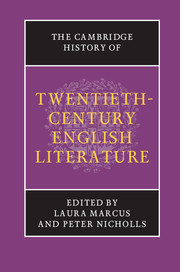Book contents
- Frontmatter
- Introduction
- PART ONE WRITING MODERNITY
- PART TWO THE EMERGING AVANT-GARDE
- PART THREE MODERNISM AND ITS AFTERMATH, 1918–1945
- 10 Trauma and war memory
- 11 The time–mind of the twenties
- 12 Modern life: fiction and satire
- 13 Modernist poetry and poetics
- 14 Modernity and myth
- 15 Psychoanalysis and literature
- 16 Biography and autobiography
- 17 ‘Speed, violence, women, America’: popular fictions
- 18 Theatre and drama between the wars
- 19 Literature and cinema
- 20 The thirties: politics, authority, perspective
- 21 Literary criticism and cultural politics
- 22 Surrealism in England
- 23 World War II: contested Europe
- 24 World War II: the city in ruins
- PART FOUR POST-WAR CULTURES, 1945–1970
- PART FIVE TOWARDS THE MILLENNIUM, 1970–2000
- Bibliography
- Index
- References
12 - Modern life: fiction and satire
from PART THREE - MODERNISM AND ITS AFTERMATH, 1918–1945
Published online by Cambridge University Press: 28 March 2008
- Frontmatter
- Introduction
- PART ONE WRITING MODERNITY
- PART TWO THE EMERGING AVANT-GARDE
- PART THREE MODERNISM AND ITS AFTERMATH, 1918–1945
- 10 Trauma and war memory
- 11 The time–mind of the twenties
- 12 Modern life: fiction and satire
- 13 Modernist poetry and poetics
- 14 Modernity and myth
- 15 Psychoanalysis and literature
- 16 Biography and autobiography
- 17 ‘Speed, violence, women, America’: popular fictions
- 18 Theatre and drama between the wars
- 19 Literature and cinema
- 20 The thirties: politics, authority, perspective
- 21 Literary criticism and cultural politics
- 22 Surrealism in England
- 23 World War II: contested Europe
- 24 World War II: the city in ruins
- PART FOUR POST-WAR CULTURES, 1945–1970
- PART FIVE TOWARDS THE MILLENNIUM, 1970–2000
- Bibliography
- Index
- References
Summary
The epoch between the end of World War I and that of World War II is framed by two of the landmark prose satires of the century. However, while Wyndham Lewis’s Tarr (1918) is an uncompromising product of the Modernist avant-garde, George Orwell’s Animal Farm (1945) employs the traditional form of the fable to put across its complex critique of revolutionary socialism with almost populist clarity, the epitome, in every way (apart from its brevity) of all that High Modernism spurned. Other satires of note appeared in the interim, so although the 1918–45 period is most strikingly an era of ambitious rebuilding in Anglo-Irish fiction, with Joyce and Woolf as its leading architects, it is hardly less boldly a time of demolition (both of the certainties of the past and the enthusiasms of the present), with Lewis, Aldous Huxley and Evelyn Waugh as its foremost iconoclasts. Moreover, although the type of social satire with which these three novelists are associated largely dies out by the mid-1930s (before resurfacing, mutatis mutandis, in the 1950s novels of Kingsley Amis and Angus Wilson), a satirical spirit pervades the period’s literature and is evident, for example, in Ulysses, Jacob’s Room, The Waste Land, Orlando, Finnegans Wake and Between the Acts. ‘Imuch doubt that any young person of our time can be impressed by a poem, a painting, or a piece of music that is not flavored with a dash of irony’, the cultural critic José Ortegay Gasset remarked in 1925.
- Type
- Chapter
- Information
- The Cambridge History of Twentieth-Century English Literature , pp. 218 - 231Publisher: Cambridge University PressPrint publication year: 2005

